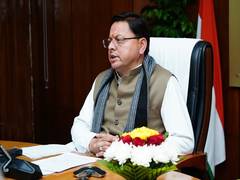Delhi HC issues notice to CBI on Kejriwal’s plea challenging his arrest
New Delhi [India], July 2 (ANI): The Delhi High Court on Tuesday issued notice to the Central Bureau of Investigation (CBI) on a plea moved by Delhi’s Chief Minister Arvind Kejriwal against his arrest by the Central Bureau of Investigation (CBI) in Excise Policy case.
The bench of Justice Neena Bansal Krishna after hearing initial submissions of Senior Advocate Dr Abhishek Manu Singhvi, said a reply was to be filed within 7 days and a rejoinder in 2 days thereafter. The court listed the matter for a detailed hearing on July 17, 2024.
During the submissions, Senior Advocate Abhishek Manu Singhvi apprised the court that we are about to file the bail plea, but as of now, nothing has been filed.
Kejriwal’s plea submitted that the arrest of the petitioner is in clear violation of the statutory mandate as prescribed under Section 41 and 60A CrPC.
The offence alleged against the petitioner has a maximum punishment of 7 years and hence compliance with Section 41 and 60A CrPC is mandatory and cannot be obviated by the investigating officer.
In the present case despite the offence being punishable by 7 years, the requirement of Section 41A and 60A notice was not adhered to by the Investigating officer and hence the arrest of the Petitioner without compliance with the requirement as mandated under law is illegal and non-est in law.
No proper justification or reasoning was provided for the arrest, especially considering the investigation has been ongoing for two years, stated Arvind Kejriwal in his plea before the Delhi High Court.
Kejriwal’s plea further stated that his arrest was allegedly based on material in CBI’s possession before June 4, adding that arrest on previously available material is illegal as it involves re-evaluation, which is not permitted by law.
CBI received permission to investigate under Section 17A of the Prevention of Corruption Act, 1988, only on April 23. CBI has not shown any evidence obtained after April 23, justifying the arrest under Section 41 (1)(b)(ii), he stated in his plea before the Delhi High Court.
The Rouse Avenue Court of Delhi on June 29, sent Delhi Chief Minister Arvind Kejriwal to Judicial custody in connection with the Excise policy case on Saturday.
The CBI alleged that during the police custody remand, the accused Arvind Kejriwal was examined, and interrogated. However, he did not cooperate with the investigation and deliberately gave evasive replies contrary to the evidence on record.
On being confronted with the evidence, he did not give a proper and truthful explanation regarding the enhancement of the profit margin for wholesalers from 5 per cent to 12 per cent under the new Excise Policy of Delhi 2021-22, without any study or justification, said CBI.
He also could not explain why during the peak of the second wave of Covid, the Cabinet approval for a revised Excise Policy was hurriedly obtained through circulation within 1 day, when the accused persons of the South Group were camping in Delhi and holding meetings with his close associate Vijay Nair, CBI said.
He evaded the questions regarding the meetings of his associate Vijay Nair with various stakeholders of the liquor business in Delhi and demanded illegal gratification from them for favourable provisions in the upcoming Excise Policy, the CBI added.
He also could not give a proper explanation regarding his meeting with Magunta Sreenivasulu Reddy, accused Arjun Pandey, and accused Mootha Gautham of India Ahead News. He also evaded questions regarding the transfer and utilization of ill-gotten money to the tune of Rs 44.54 crore in Goa Assembly Elections by his party during 2021-22, the CBI said.
In the light of aforesaid facts and circumstances, the further custodial interrogation of the accused Arvind Kejriwal is not required at this stage, the CBI said.
CBI alleged that Kejriwal was deliberately and intentionally evading the just and relevant questions related to the case.
Kejriwal, being a prominent politician and Chief Minister of Delhi, is a very influential person, as such, there are credible reasons to believe that Kejriwal may have influenced the witnesses and evidence already exposed before him during the custodial interrogation and also the potential witnesses, who are yet to be examined, tamper with the evidence to be further collected and may hamper the ongoing investigation, the CBI added.
On June 26, the trial court’s vacation judge sent Arvind Kejriwal on three days Custodial Remand of CBI.
Arvind Kejriwal himself addressed the court and said, “CBI is claiming that I have made a statement against Manish Sisodia, which is completely false. Manish Sisodia Nirdosh hai, Aam Aadmi Party Nirdosh hai. main bhi nirdosh hun. Iss Tarah ke statements hamme media me badnam Karne ke liye diye ja rahe hai. (Manish Sisodia is innocent, Aam Aadmi Party is innocent. I am also innocent. Such statements are being given in the media to defame us.)”
He also added “CBI sources ke hawale se media me hamme badnam kar rahe rahe hai. Inka plan hai ki media front page ye chala de ki Kejriwal ne sara thikra Manish Sisodia pe daal diya. (They are defaming us in the media, citing CBI sources. Their plan is to have the front page of media run a story stating that Kejriwal has put all the blame on Manish Sisodia.)”
However, the Court said, “Apki statement maine pad liya hai… apne aisa nahi bola. (“I have read your statement… you did not say this.”)”
CBI counsel earlier alleged that on May 25, 2021, policy was notified. Before this first attempt was made to meet liquor barons. The policy wasn’t notified. But the process of finding suitors started?
Meanwhile, Senior Advocate Vikram Chaudhari appeared for Arvind Kejriwal opposed the remand application moved by CBI, and said the CBI has filed four chargesheets till now and now arresting Kejriwal and it still has to identify some persons through Kejriwal. Is this a valid reason for arrest?
Kejriwal’s lawyer further added that according to CBI Kejriwal gave evasive replies during his examination/Interrogation in Tihar jail. The investigation officer of the case called it evasive because the only reply they want is Kejriwal’s admission of guilt.
Chaudhri also questioned the timing of Kejriwal’s arrest, saying, They (referring to CBI) were waiting for the pronouncement of Kejriwal’s bail order. They could’ve arrested Kejriwal on June 2 when he surrendered. The materials must be perused by the Court before granting them (the CBI) the custody of Kejriwal.
On June 26, the CBI arrested the Aam Aadmi Party (AAP) national convenor Kejriwal after the Vacation Judge of the Delhi Court allowed the CBI to examine, and interrogate him in the courtroom so that the agency could proceed with his formal arrest.
The court also asked the CBI to place on record the material that they have for Kejriwal’s arrest.
The Delhi High Court recently stayed Chief Minister Arvind Kejriwal’s bail order passed by the trial court, saying that the trial court should have at least recorded its satisfaction with the fulfilment of twin conditions of section 45 of Prevention of the Money Laundering Act (PMLA) before passing the impugned order.





